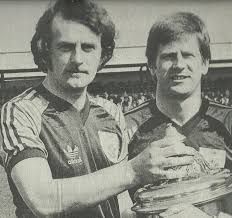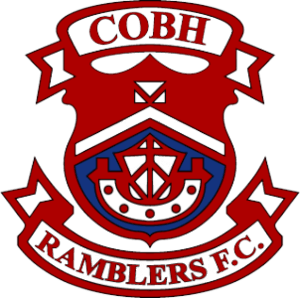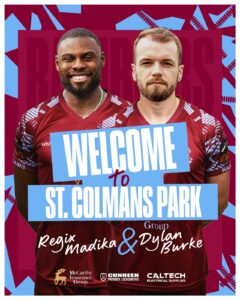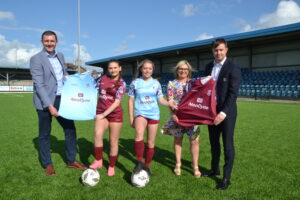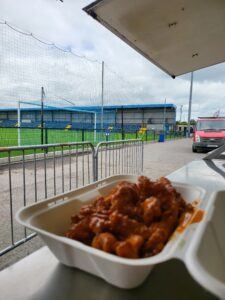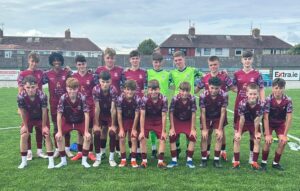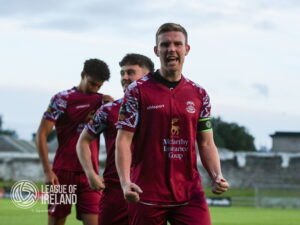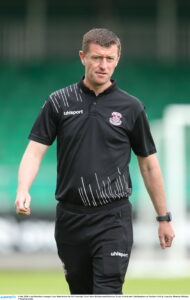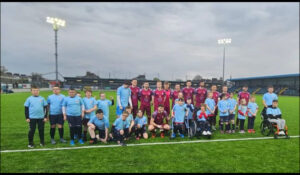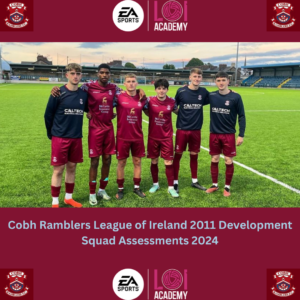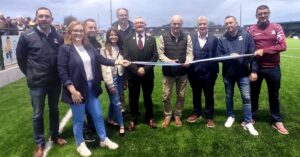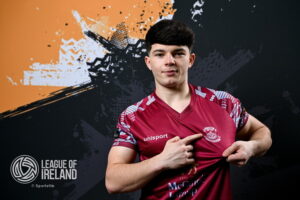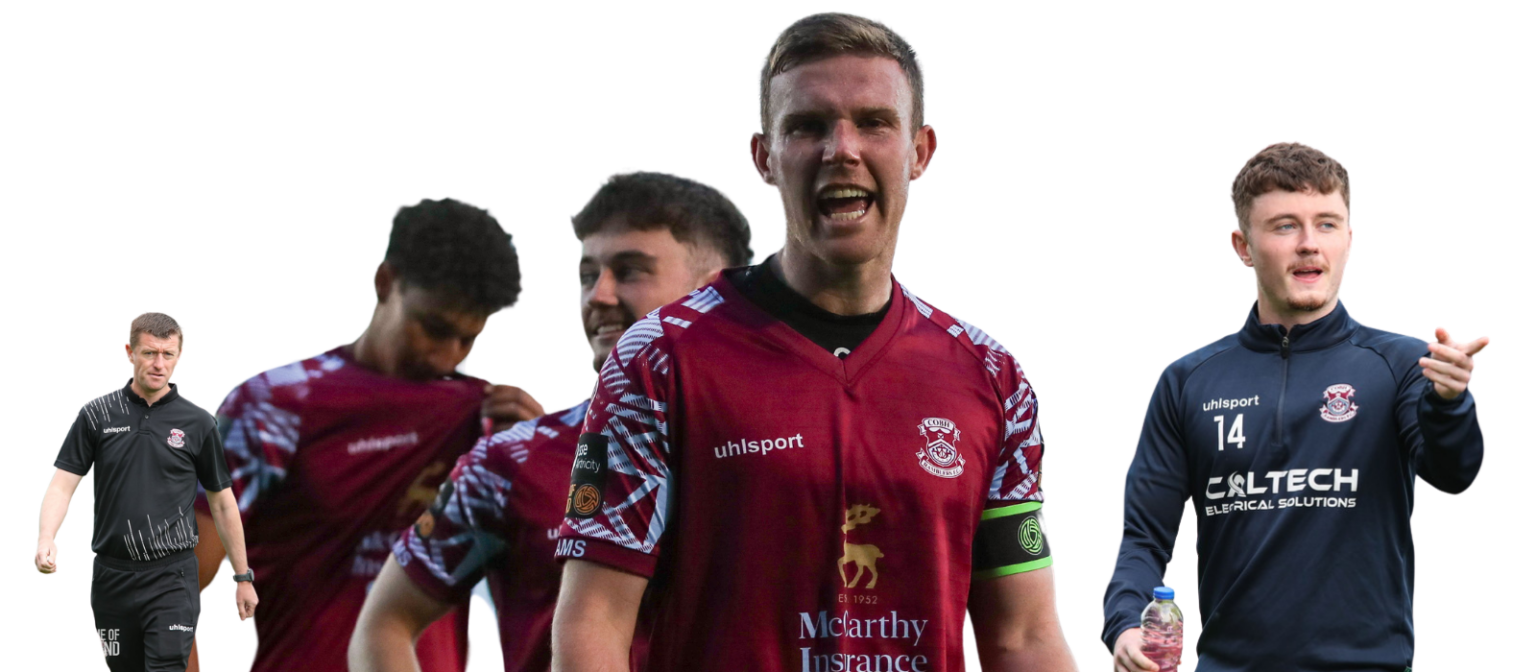FRANK “SNIFFER” O’NEILL – By Club President Michael Geasley
The light went out on a truly great sporting institution of Cobh on Sunday morning last. That Frank O’Neill had been ill for some time didn’t make it any easier for his family or friends formed over a long time of sporting involvement. Frank O’Neill was truly a player of instinct. That intuitive magic, not bought, not made, but God given gift gifted to him on the day he was born – that of knowing to be in the right place at the right time. In other words, a goal poacher’s instinct. Every Cobh Ramblers team from the time he retired playing, could have done with a clone of the original “Sniffer”.
Saturated with the glory of playing soccer from an early age, even more so with Cobh Ramblers above all others. His gifts burned brightest of all on a football field, it consumed him, as it did spectators alike, the powers of manipulation, always to delight, created Frank “Sniffer” O’Neill as the focus of hero worship. The mantle of his father’s legacy, Paddy O’Neill was indeed great. Football is a divine intervention when you are young, an instrument of the imagination, one could create the most wonderful theatre of heroes you admired, of goals scored, games won, measuring up yourself against those who showed a superior aptitude to studies or such. His father made for a splendid teacher, as manager of Springfield in Frank’s last year in Youths football. Prior to which, Frank had come under the astute managerial combo of Liam McMahon and Tim Boyle. The comradery developed with such local players as Liam Amphlett, Eddie Frahill, George Wilshaw, Con Brierley, and long-time friend, Terry Shealy, translated from the Springfield academy to that of Cobh Ramblers upon joining. Frank’s selection for the Cork AUL Youths squad that represented the Republic of Ireland in an International Tournament in Coventry in 1972, was another step on the ladder, if you discount the fact that they suffered losses at the hands of hosts, England, France, and Italy. Casting his eye was Paul O’Donovan, then manager of Cork Celtic, on this will-of-a-wisp player, always urgent, but never in a hurry, but who had still knocked five goals past the Celtic netminder in a virtuoso show of finishing, against his Cork Celtic Youth team at St. Colman’s Park. Football up to now had for Frank been a release from more dutiful obligations, now it was to become much more.
Tender in years still, just 19, he signed for Cork Celtic. Frank had already one MSL title to his name, having played in the final six games of season 1971/72. Initially unsympathetic was Paul O’Donovan, to playing Frank in the opening two games of season 1972/73. He did relent and a debut game for Frank was a home Shield encounter with Waterford United at the ‘Cross in September. Frank throughout his career dealt in the currency of goals, his maiden game was no different, scoring in a 1-1 draw. His ratio for the season was a conservative figure of just four league goals. The sequel to unfold shocked, or should that be surprised, LOI football supporters not just in Cork but nationwide, with Cork Celtic claiming a first and only League title success in 1974. Frank was in the company of legends of the LOI game and beyond, such as Alec Ludzic, Ben Hannigan, Paddy Shortt, Alfie Hale and Bobby Tambling, but singular of mind as only great strikers knows how, or need to be, and he was rewarded with the grand total of 12 league goals. He was top of the Celtic goal scorers list – prince of the goal poachers in such celebrated company. Never one to find space for vanity, but his ‘Player of the Month’ award in November 1973 was greatly enhanced with a hat-trick of goals in a 6-2 win over Waterford United in KIlcohan Park.
Frank’s response to the disillusioning realities of the professional game was out of character for one so tender in years, sensitive that he might in some way unhinge Celtic’s pursuit of the Holy Grail of LOI football, saw him hold his counsel when dropped in favour of Carl Davenport and Alfie Hale with a mere six games remaining of the campaign. He saw confrontation under the circumstances as futile and possibly demeaning for both himself within the group and the collective spirit within the squad, that did eventually get them over the line. He was back in favour for the 6-1 rout of Limerick City in the Munster Cup Final. Pre-season and in August of 1974, Celtic were in Dunstable to play the local side in a friendly fixture – the first game of a three-game tour of England. The ground was overflowing, Frank’s scoring deeds had not preceded him, or had they? No, instead the local side had conceived and landed a coup in the signing of one Georgie Best. Like Frank, George did nothing extraordinary on the day, he just did what was natural.
Failure to agree personal terms with Paul O’Donovan, Frank was on 15 pounds a week, speeded his return to his spiritual home of St. Colman’s Park. The contentment was fine, but not constant and maybe Frank thought he had some unfinished business at LOI level, and so at the behest of Bobby Tambling, now the Celtic manager, he returned for season 1975/76. The headliners were Messrs. Best and England World Cup winner and hat-trick hero. Geoff Hurst. The title success was just a mere memory for Frank, and feeling a mere pawn, which was reflected with return of just two league goals, he would return to Ramblers once more, but return this time to stay.
There was always drama, his winner in Kilkenny pitched Ramblers into a League Cup S-F with the mighty Shamrock Rovers in Cobh in September 1976. It proved a venture into reality as Rovers won in a canter by 0-3. The image of both club and the individuals who made up the squad was all the time increasing, projected by the success at local level as Ramblers ushered in a dominance of MSL football not witnessed before. Frank was enhancing his own personal reputation in averaging 30 goals plus a season. Civic pride was bestowed upon the collective unit that finally banished what contemporaries had failed to achieve as five times beaten Intermediate Cup finalists – win the Intermediate Cup, which they did against Tramore Athletic by 2-1 in a glorious day in St. Colman’s Park. Frank now had his younger brother Paul in tandem on the team. That Frank was a substitute on the day was a hurt that he could forgive, and he did, but could never forget.
A “Sniffer” special helped end the Cup hopes of Galway United in 1981(3-1), but Finn Harps it was who ended Ramblers’ hopes of a semi-final place with a 1-4 victory in Cobh. 1981 gave way to 1983 and all that it encompassed. Triumph nourished the community and they wanted more, which they got as Ramblers reached the FAI Cup semi-final only to be denied A Cup Final place after a four-game gaga with Sligo Rovers. Frank’s quarter-final winner over Finn Harps was a ‘jewel’ amongst his vast collection; it had his late mother proclaiming; “that he was the most eligible bachelor in Cobh.” That he was! A little story from the game which in essence summed up the quick wittedness that had characterised Frank O’Neill throughout his life. Jim Burke, Chairman of Ramblers, lamented to Frank after the game that he “didn’t even see the goal.” “You know”, returned Frank, “somebody else said the same thing.” “Who?” asked the Chairman. “The goalkeeper!” smiled Cobh’s most famous milkman. ‘You will always score with Franko’ was his sales logo on his daily delivery truck. Human frailty had denied Ramblers a Cup Final place, that after Frank had engineered a two-goal lead at the Showgrounds. There was no enduring sadness for Frank in losing to Sligo, after all a second Intermediate Cup Final success was already under wraps. Frank was an invited guest amongst others from the club, at the Cup Final itself to see Sligo lift the trophy for the very first time.
Six MSL titles in succession (1979-85) and Ramblers had evidently outgrown the League in which they were operating out of, previous approaches at joining the LOI ranks had been rejected, but not so another in 1985 and Rambles were in. Who else would you select but Frank to invade club history in scoring both goals in the inaugural League fixture at St. Colman’s Park and a 2-1 win over Monaghan United. Without any illusions on grandeur on whom he was or what he had achieved, Frank slipped out of the limelight, content to play out his time with the MSL side for two more seasons. Assistant secretary to the gentlemanly figure of the late John Grayley, was the closest Frank got to assuming an administrative role with the club. Two years as a referee 1987/89 seemed to draw a curtain call on his involvement, which was then confined to conversation and reflection that he did as much as anybody to inspire. Assuming the Captaincy of his new love in sport, that of golf in 1991, it was not impulse that made him cast aside his normal caution, but the fact that it was George Mellerick on behalf of Cobh Ramblers asking him to return as manager of the MSL side in 1993. Frank did take up the referee’s whistle again, but aching limbs rather than father time forced him to retire in later years.
Marital status did eventually catch up with Cobh’s most eligible bachelor, settling in Maurice Moore’s Place with wife Mary, sons Robert and Kevin, and daughter Julie. Moore’s Place is a housing estate that runs parallel with St. Colman’s Park, it was where Frank was born and raised, ironic that before it became a housing estate it was a place called home by Cobh Ramblers prior to finding their permanent and spiritual home at St. Colman’s Park. Cobh Ramblers Player of the Year in 1982, Frank’s crowning glory was on entry to the Cork AUL Hall of Fame in 2018.
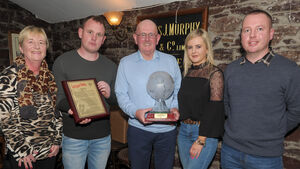
https://rip.ie/death-notice/frank-sniffer-oneill-cork-cobh-553222
Ar dheis Dé go raibh a anam
Cobh Ramblers Football Club

